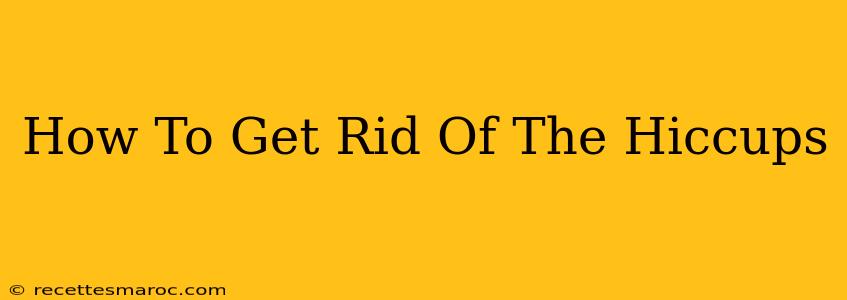Hiccups. Those annoying, involuntary spasms of your diaphragm that can disrupt anything from a quiet dinner to a crucial presentation. We've all been there, that frustrating rhythm of hic hic hic echoing in the room. But fear not! This comprehensive guide explores various methods to banish those pesky hiccups, from simple home remedies to slightly more unusual techniques.
Understanding Hiccups: A Quick Anatomy Lesson
Before diving into solutions, let's briefly understand what causes hiccups. Hiccups, medically known as singultus, occur when your diaphragm, the muscle separating your chest and abdomen, contracts unexpectedly. This spasm often triggers a sudden closure of your vocal cords, resulting in that characteristic "hic" sound. While often harmless and short-lived, persistent hiccups (lasting longer than 48 hours) warrant a visit to your doctor to rule out any underlying medical conditions.
Common and Effective Hiccup Remedies
Here are some tried and true methods to get rid of hiccups quickly and efficiently:
Simple Breathing Techniques:
- Holding Your Breath: Try holding your breath for as long as you comfortably can. The build-up of carbon dioxide can sometimes reset your diaphragm.
- Breathing into a Paper Bag: This method is debated, but some find that breathing slowly into a paper bag (use caution and avoid plastic bags) can help regulate carbon dioxide levels and stop hiccups. Important Note: This should only be attempted for a short duration and is not recommended for people with respiratory issues.
- Controlled Breathing: Practice slow, deep breaths, focusing on inhaling deeply and exhaling slowly. This can help calm your nervous system and alleviate the spasms.
Other Effective Home Remedies:
- Drinking Water: The simple act of drinking a glass of water, especially if done slowly and deliberately, can often interrupt the hiccup cycle. Try drinking it upside down, or from the far side of the glass.
- Swallowing: Swallowing a spoonful of sugar or a small piece of dry bread may also help to reset the diaphragm.
- Distraction: Sometimes, the best way to stop hiccups is to simply distract yourself. Try engaging in a different activity, like reading or focusing on a conversation, to break the hiccup rhythm.
- Gargle with Water: Gargling with a mouthful of water might help relax your throat muscles and stop the hiccups.
Less Common, But Sometimes Effective, Techniques:
While the methods above are widely used and generally safe, here are a few alternative approaches that some people find helpful:
- The Valsalva Maneuver: This involves holding your breath while pinching your nose and trying to exhale forcefully. It increases pressure in your chest, potentially interrupting the hiccup spasms. Use caution and avoid if you have any heart or blood pressure conditions.
- Tongue Pulling: Gently pulling your tongue out for a few seconds can sometimes help.
- Scare Tactic: A sudden surprise or fright can sometimes startle your diaphragm into stopping. Use with caution and only in safe environments.
When to See a Doctor
Most hiccups resolve on their own within a short time. However, persistent hiccups (lasting more than 48 hours) or hiccups accompanied by other symptoms like nausea, vomiting, fever, or difficulty breathing warrant immediate medical attention.
Conclusion
Dealing with hiccups is often a matter of trial and error. Experiment with different methods to find what works best for you. Remember to prioritize safety and consult a doctor if your hiccups are persistent or accompanied by other concerning symptoms. With a little patience and these tips, you should be able to say goodbye to those pesky hics in no time!

